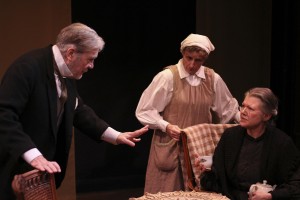It is December 31, 1899. The Stanhope family has gathered to close up the home of Alison Stanhope, whose poetry has become famous in the nearly two decades since her death. The surviving Stanhope siblings—the slightly strange Agatha and straight-laced John—have carefully controlled their famous sister’s public reputation. Now, on the eve of a new century, the discovery of a secret stash of Alison’s writings exposes a stark divide between the generations.
Inspired by the life of Emily Dickinson, Alison’s House by playwright Susan Glaspell, won a Pulitzer Prize in 1931 despite negative reviews and a meager two-week run. It was one of a string of controversial picks by the Pulitzer committee that eventually led to the creation of the New York Drama Critics' Circle. Metropolitan Playhouse’s production may be the first uncut staging of the play in New York since 1931.
At the heart of Alison’s House is the question of whether duty and honor or personal happiness and self-realization are paramount. Elsa Stanhope, who alienated her father John and gave up her good name to run away with her married lover, represents the values of the younger generation. John and Agatha hold up the example of Alison, who in a similar circumstance chose her good name, became a recluse, and subsumed her love in writing.
Unfortunately, artistic director Alex Roe’s respectful staging of Alison’s House does not reveal a forgotten masterpiece. While the text is solid, charming and often amusing, the central conflict between Victorian values and a youthful desire for personal fulfillment must have seemed out of date even at the time of the original production. Some of the lack of urgency is due to the production’s uneven pace. While the bulk of the production is performed in a leisurely fashion, the actors race through the climactic moments of both acts.
Another problem comes from the lack of a strong antagonist. John D. McNally’s John Stanhope is so genial and warm that his role as the representative of the past, a forbidding father who upholds honor at all costs, becomes blurred. Other cast members struggle, too. Blaine Smith can’t quite overcome the fact that he seems a decade too old to play the puckish Ted Stanhope, while Matt McAllister and Katharine Scarborough come across as visitors from another broader play.
Standouts in the cast include John Long as the weary, harassed Eben Stanhope, and Anne Bates as his wife, Louise, who cannot earn love despite molding herself into an ideal Victorian wife and daughter-in-law. Amanda Jones’ performance as Elsa is the highlight of the evening. Her touching performance drives scene after scene in the final act.
Roe has staged the play on a compact thrust stage, which transforms during intermission from a library in the public part of the house to Alison’s private bedroom, where all her secrets are revealed. The set serves the play well, especially during scenes involving many characters, although there are some problems with sightlines during intimate scenes (especially the play’s climax). Sidney Fortner’s costume design neatly illustrates the generational and social divides between the characters in Alison’s House. While the elder Stanhopes are clothed in sober browns and blacks, the younger members of the family—especially Ted and Elsa—wear brilliant red.
Metropolitan Playhouse’s production is a solid presentation of an underwhelming script. Still, it is a good opportunity to see a rarely staged work by the much-anthologized Glaspell. Perhaps Glaspell’s farewell to the Victorian age, with its rigid, hoary values, can still speak to the present day. Even now, young people struggle to find fulfillment in ways that make their parents want to shake their heads and say, as John Stanhope does, “I cannot bear your youth.”
Alison's House is running at the Metropolitan Playhouse (220 East 4th St. between Avenue A and B) in Manhattan until Dec. 13. Performances are at 7:30 p.m. on Thursday-Saturday and 3 p.m. on Wednesday, Saturday and Sunday. Tickets: $25 for general admission, $20 for students/seniors and $10 for children. To purchase tickets, call 800-838-3006 or visit www.metropolitanplayhouse.org/







